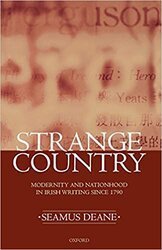Reflection: Sara Maurer

I can remember the exact day (October 24, 1999) and exact place (a lumpy third-hand tan couch under the sloping roof of my second-floor apartment in Bloomington, Indiana) I was when I began to read Seamus Deane’s Strange Country. I had spent the fall trudging joylessly through an exam reading list crammed with sociological and political scientific theories of nation, charting out the various pronouncements of Liah Greenfield, Anthony Giddens, Eric Hobsbawm and Ernest Gellner on what metrics might definitively indicate a collectivity that had transformed into a nation. Strange Country seemed like the first book on literature that I had read in months, but more urgently than that, by the time I was twenty pages in, it was a book that made me feel as if I hadn’t ever really read a work of literary criticism before. Deane dealt with exactly the same elements of national definition as had my sociological sources, but in his hands the questions were intimately literary. The contest between an Enlightenment modernity and a cultural nationalism cherishing what modernity aimed to leave behind were, in Deane's account, the structuring pattern behind plots that had to choose between endings involving marriage and endings involving alcoholism, behind the oft-recounted and self-dramatized destruction of James A. Mangan's last days, even behind a certain Eastern European vampire looking to buy real estate in the heart of London, but equally invested in bringing his own soil along with him.
Deane’s alertness to the condensed and contradictory tropes of Irish literature in the nineteenth century animated a century I had previously understood only as the stifling waiting room between literary Ireland’s Swiftian eighteenth-century and its apotheosis in Joycean modernism. The book convinced me that nineteenth-century Irish literature merited careful and sustained study. When I arrived at Deane’s concise anatomization of the imaginative work done when Irish nationalists conceptually divided “the object that is nominated as Ireland” into a state-run “territory,” an economic and civil “land,” but also an eternal and communal “soil” that eludes the definitions of the other two entirely, I found I had arrived at a poetics complex enough to fuel my entire dissertation.
I arrived at Notre Dame in the fall of 2003, only nine months before Seamus would retire from his post in South Bend. But I would not have arrived there at all without his body of work, and I remain deeply indebted to him for modeling an intellectual orientation that anticipates finding in all truly interesting political questions a deeper figurative energy that calls for the work of a literary critic.
Sara Maurer is Associate Professor of English and a fellow of the Keough-Naughton Institute for Irish Studies. Author of The Dispossessed State: Britain, Ireland, and Narratives of Ownership in the Nineteenth Century, she specializes in the study of British and Irish nineteenth-century literature, gender studies, and post-colonial studies.